Pre-Departure Orientation. The topics to be covered today


Pre-Departure Orientation

The topics to be covered today are: Planning Your Trip to the U.S. Travel Documents Travel Arrangements What to Pack Your Luggage Arrival in the U.S. Adjusting to Life in the U.S.

J-1 Visa Requirement The "J" exchange visitor program is designed to promote mutual understanding between the people of the U.S. and the people of other countries by means of educational and cultural exchanges In order to maintain your J-1 visa status, you will have to maintain professional and personal standards during your stay in the U.S.

J-1 Visa Requirement, cont. Under the laws governing the J-1 visa, you must return to your home country for a period of at least two years immediately upon completion of program No visa extensions or transfers, whether for U.S. undergraduate or master’s programs, other academic study, employment, practical training in the U.S., or any other activity, will be granted by ECA

J-1 Visa Requirement, cont. Marriage to a U.S. citizen or birth of a child in the U.S. does not exempt fellows of the two-year home residency requirement The program will not sponsor or provide assistance for dependents’ visas

Accident and Sickness Insurance ECA Accident Sickness Program for Exchanges (ASPE) covers any accident or sickness. The provided Insurance will NOT cover: Pre-existing conditions and the cost of prescription medicines for pre-existing conditions* Routine health examinations Eye care and dental care, unless it is related to an emergency condition or accident

Accident and Sickness Insurance, cont. *Please bring a supply of any prescription or other medications you take. These medications will not be covered by the provided Accident and Sickness Insurance.

Planning Your Trip to the U.S. Travel Documents and Visa Regulations Travel Arrangements

Travel Documents and Visa Regulations, cont. To enter the U.S., all participants must have: A passport that is valid for at least six months beyond the expiration date of their grant period A J-1 exchange visitor visa A valid DS-2019 form called a Certificate of Eligibility for exchange visitor status A letter of invitation from your host university

Travel Arrangements A representative from the Public Affairs Office or will contact you with details about your plane tickets and travel logistics in advance of your departure

What to Pack Custom Regulations Packing Tips and What to Bring Your Luggage

Entering the United States Customs Regulations: Gifts - Each traveler may bring in gift items up to a total of 100 U.S. dollars Narcotics, meats, fruits, vegetables, and plants - None may be imported without special permission Currency - Fellows must file a report with the U.S. Customs Service if they wish to bring more than $10,000 into the United States

Entering the United States, cont. Customs Regulations Continued: Personal effects - Fellows may bring any reasonable amount of personal effects (clothing, toiletries, jewelry), as well as equipment such as sporting goods, cameras, and radios provided they are for their own use Alcohol and tobacco - Each traveler over 21 years of age may import one liter of spirits or wine and either 200 cigarettes or 50 cigars or two kg of smoking tobacco

What to Pack – Documents Two forms of photo identification (passport and one other form such as a drivers license if available) Copy of your birth certificate and an English translation (in case you lose your passport and need to file for a new one with your Embassy in the U.S.) Copies of domestic and international passport

What to Pack – Documents, cont. Copies of U.S. visa, DS2019 form Copy of your medical history and examination form if necessary Copy of your acceptance letter

What to Pack – Documents, cont. Copies of your C.V. or resume Information about your country and its education system that you can share with other participants Information and pictures of your university, faculty, etc.

What to Pack – Country Presentations We encourage you to bring small cultural items representing your country that you can share with your peers and your host universities Items may include: postcards with views of your country/city/region small flag of your country calendars small crafts part of a national costume CDs with national music, etc.

What to Pack – Electronics Make sure all devices have a plug-in adaptor (120V) or a U.S.-friendly plug If you want to bring a laptop, make sure it has an adaptor (120V) and a U.S.-friendly plug. Photo camera

What to Pack – Personal Items Comfortable clothing - jeans, t-shirts, sweat shirts, tennis shoes, etc. More formal clothing (suit jackets, dress shirts, ties, skirts, etc) for more formal occasions Please check the climate in your U.S. host city/state, and pack a jacket and appropriate shoes for cool weather. Do NOT bring large textbooks or computer software (it may raise suspicions at customs). Do NOT bring detergents or cleaning supplies

What to Pack – Souvenirs You are welcome to bring souvenirs to share, however, please be mindful that you will be charged for overweight luggage.

What to Pack – Other Names and telephone numbers for professional and personal contacts in the U.S. and at home Any medications you are currently taking (remember to bring enough for the entire duration of the program and to pack them in your CARRY-ON luggage) Extra pair of eyeglasses and/or contact lenses

Your Luggage – International Regulations Baggage restrictions: 2 checked bags, 1 carry-on and 1 personal item, which include a coat, purse, or briefcase. Checked luggage is stored below the passenger area of the plane. Checked bags cannot exceed 22.68 kg (50 lbs) each in weight and also cannot exceed 62 inches (158 cm) when the height, width, and depth are added together Your carry-on cannot exceed 55x40x20 cm in size and must fit in overhead compartment or under the seat in front of you

Your Luggage – International Regulations, cont. For EACH additional piece of “checked” luggage beyond two, you will be charged approximately $100 You will be charged between $50-$175 for EACH piece of luggage that exceeds the weight limit or exceeds the size limit.

Your Luggage – U.S. Regulations Although you are allowed two pieces of check luggage on your international flight, we strongly urge you to bring only one piece of checked luggage that does not exceed the weight limit of 50 lbs (22.68 kg) Under U.S. regulations, you will be charged for your checked bags on the U.S. in-country flights to your host university and to the EOP There is an average fee of $15 for the first checked bag and an additional cost of $25 for the second bag for the U.S. in-country flight Plan on saving money from your stipend to pay for your luggage on your U.S. in country flights

Your Luggage – Packing Tips You should be able to carry ALL your luggage by yourself – we recommend using bags with wheels If you pack toiletries in your carry-on be sure to put them in a clear plastic bag for the security check Use luggage tags to mark ALL you checked luggage with your name and university address to help you identify the bags Follow airline regulations for size and weight (weigh your bag!)

Your Luggage- Packing Tips, cont. Label all luggage with your name and university address Include the label on the inside of your luggage as well, in case the label on the outside of the bag falls off
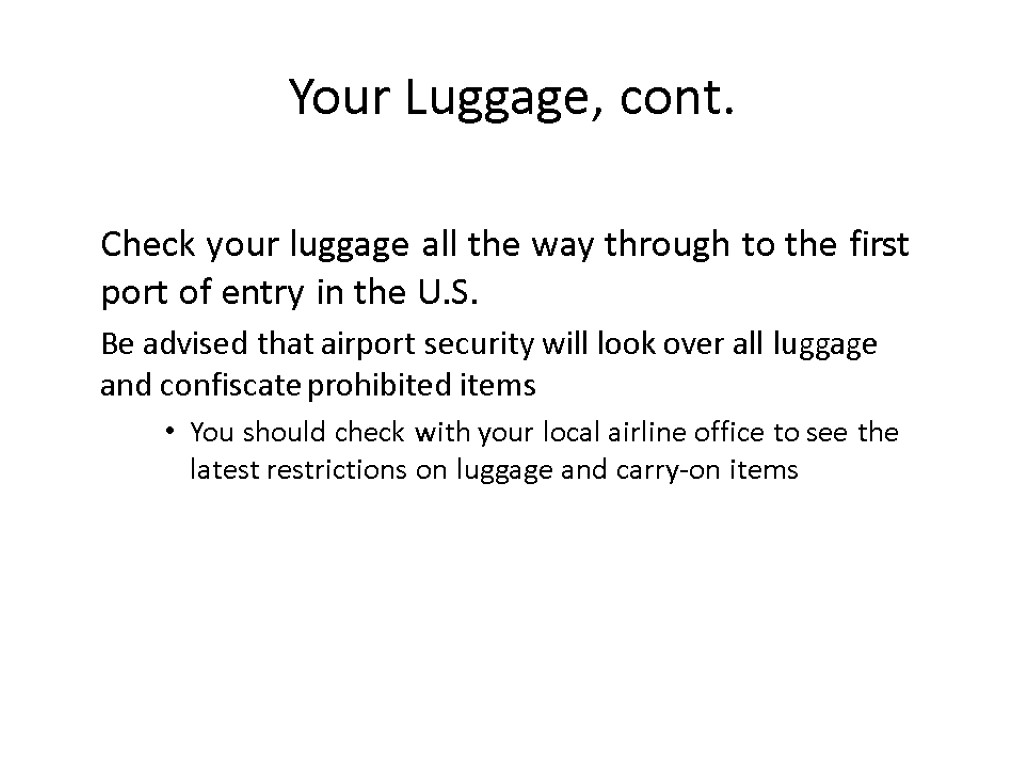
Your Luggage, cont. Check your luggage all the way through to the first port of entry in the U.S. Be advised that airport security will look over all luggage and confiscate prohibited items You should check with your local airline office to see the latest restrictions on luggage and carry-on items
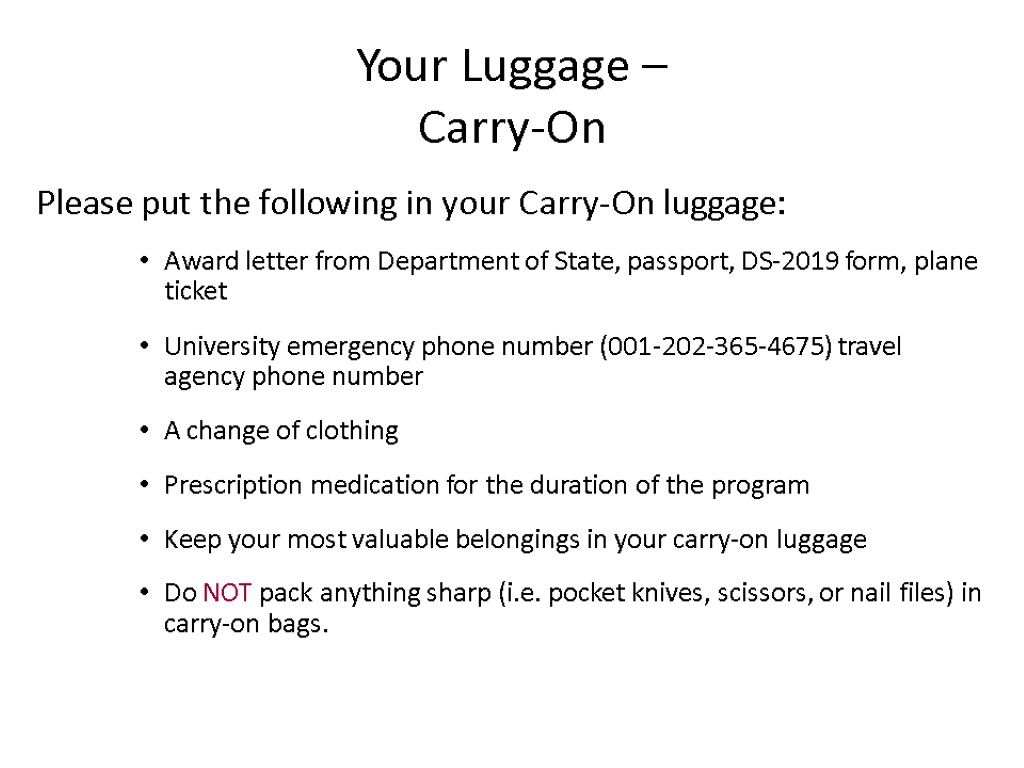
Your Luggage – Carry-On Please put the following in your Carry-On luggage: Award letter from Department of State, passport, DS-2019 form, plane ticket University emergency phone number (001-202-365-4675) travel agency phone number A change of clothing Prescription medication for the duration of the program Keep your most valuable belongings in your carry-on luggage Do NOT pack anything sharp (i.e. pocket knives, scissors, or nail files) in carry-on bags.
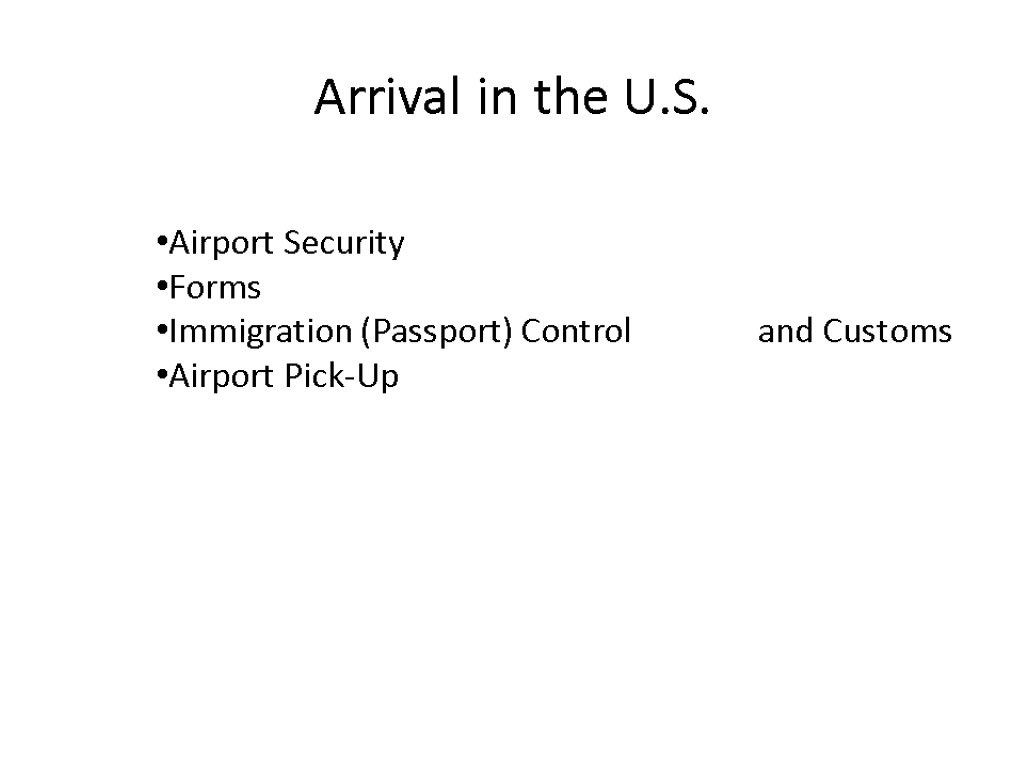
Arrival in the U.S. Airport Security Forms Immigration (Passport) Control and Customs Airport Pick-Up
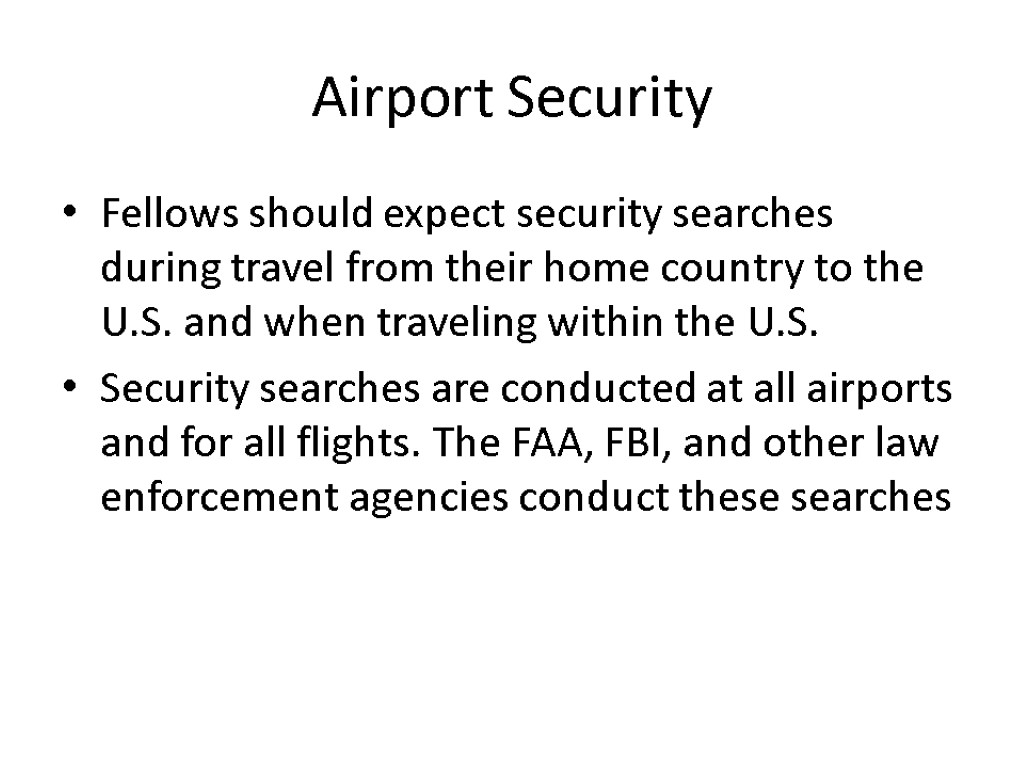
Airport Security Fellows should expect security searches during travel from their home country to the U.S. and when traveling within the U.S. Security searches are conducted at all airports and for all flights. The FAA, FBI, and other law enforcement agencies conduct these searches
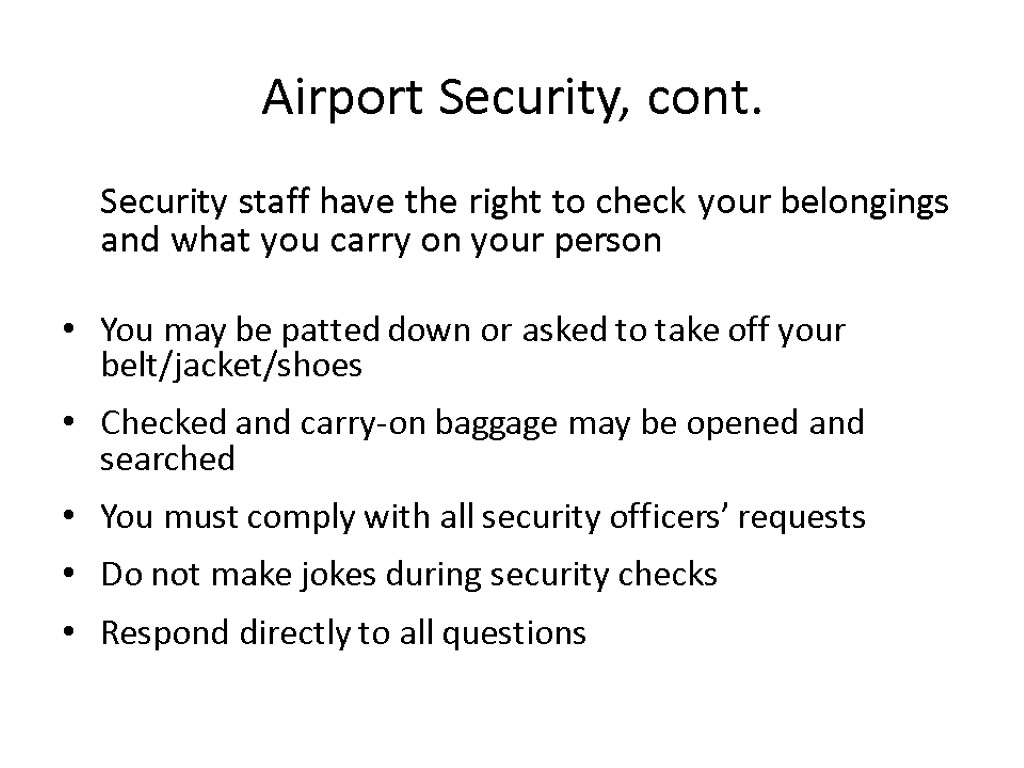
Airport Security, cont. Security staff have the right to check your belongings and what you carry on your person You may be patted down or asked to take off your belt/jacket/shoes Checked and carry-on baggage may be opened and searched You must comply with all security officers’ requests Do not make jokes during security checks Respond directly to all questions
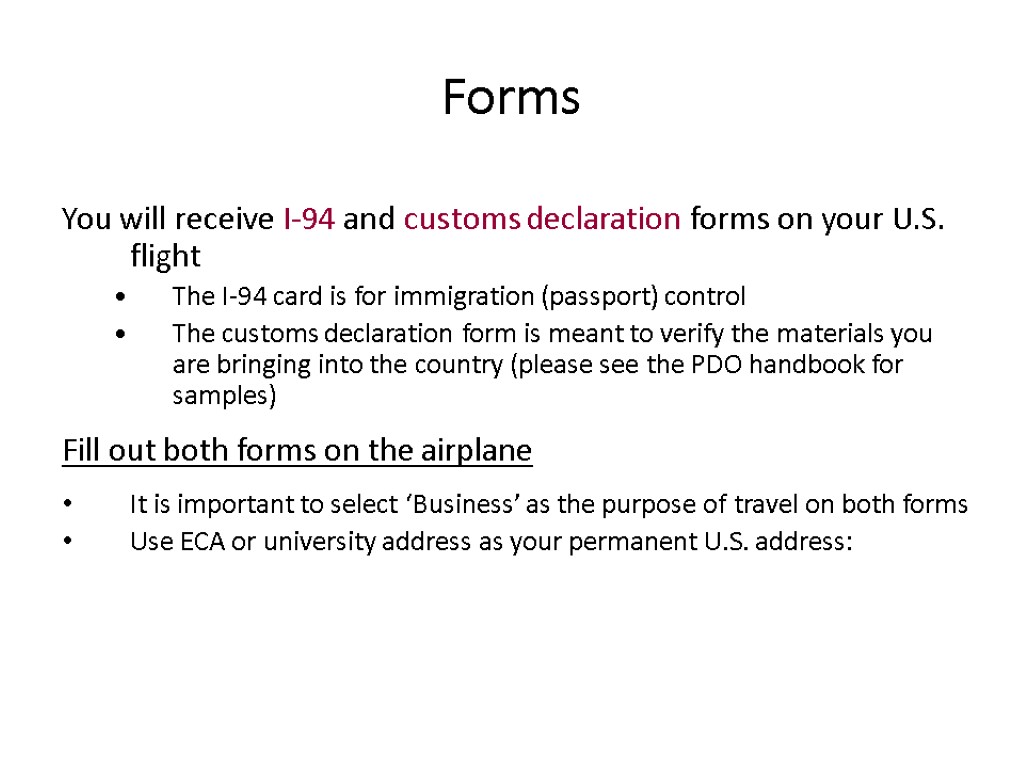
Forms You will receive I-94 and customs declaration forms on your U.S. flight The I-94 card is for immigration (passport) control The customs declaration form is meant to verify the materials you are bringing into the country (please see the PDO handbook for samples) Fill out both forms on the airplane It is important to select ‘Business’ as the purpose of travel on both forms Use ECA or university address as your permanent U.S. address:
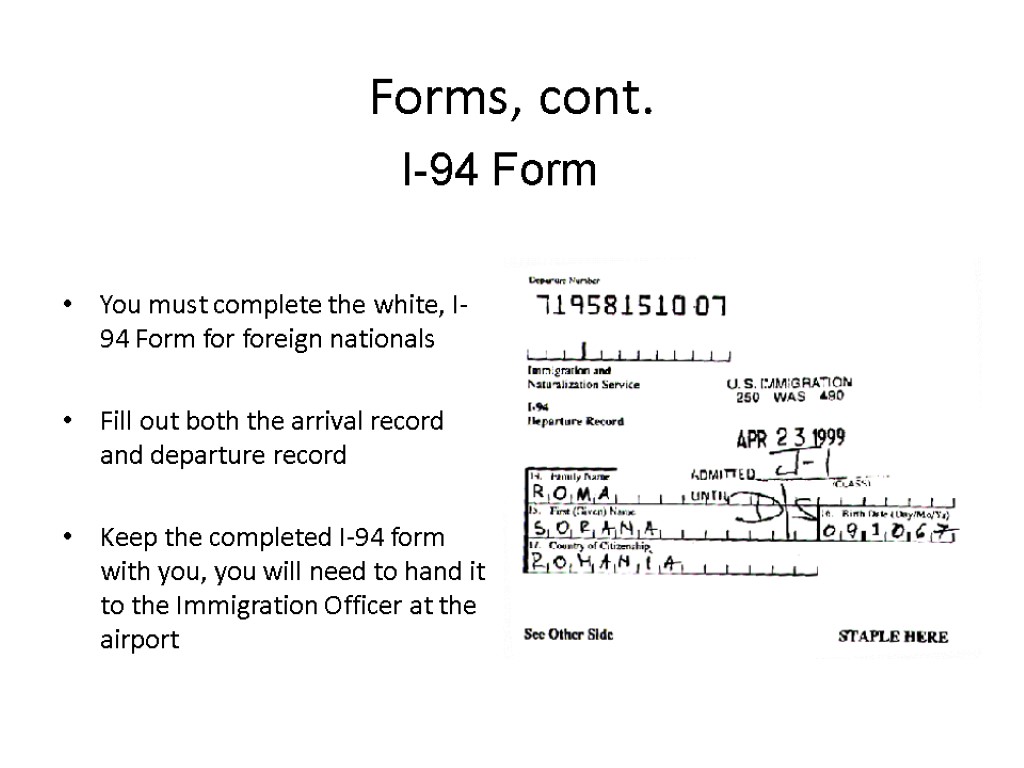
Forms, cont. You must complete the white, I-94 Form for foreign nationals Fill out both the arrival record and departure record Keep the completed I-94 form with you, you will need to hand it to the Immigration Officer at the airport I-94 Form
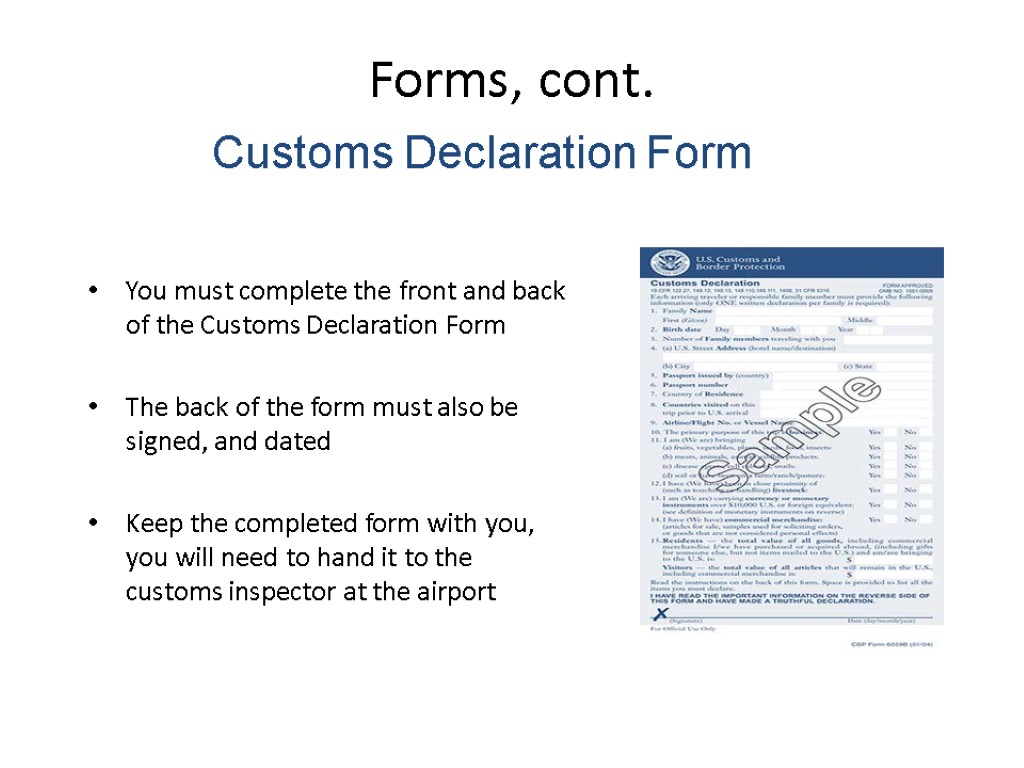
Forms, cont. You must complete the front and back of the Customs Declaration Form The back of the form must also be signed, and dated Keep the completed form with you, you will need to hand it to the customs inspector at the airport Customs Declaration Form
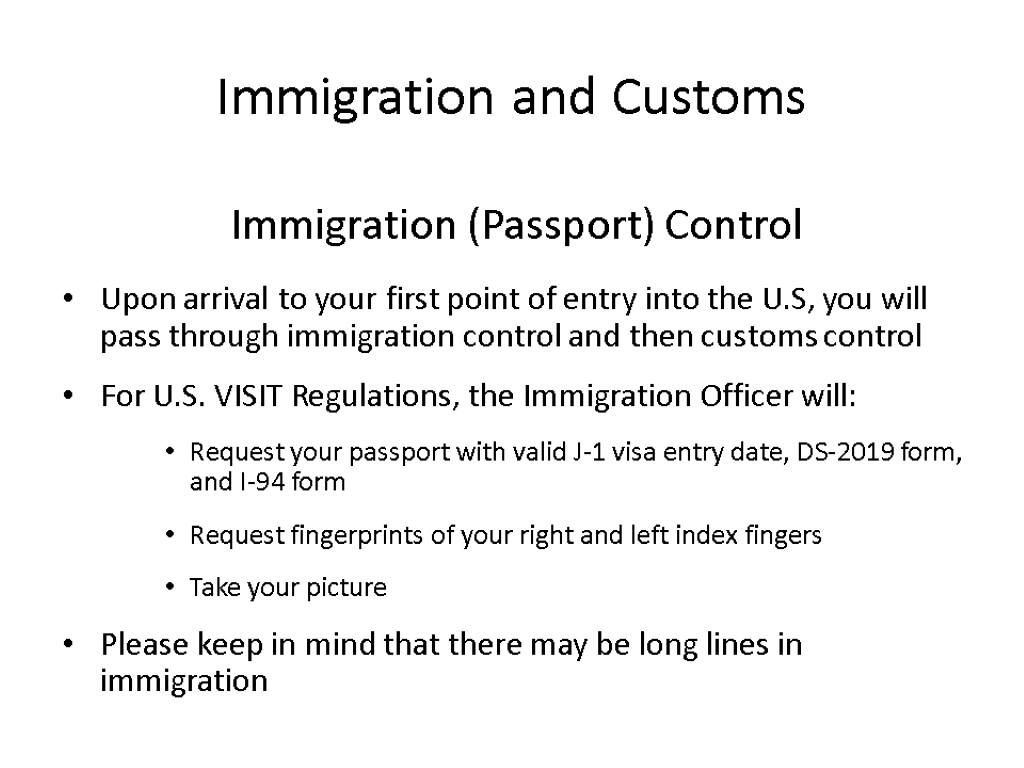
Immigration and Customs Immigration (Passport) Control Upon arrival to your first point of entry into the U.S, you will pass through immigration control and then customs control For U.S. VISIT Regulations, the Immigration Officer will: Request your passport with valid J-1 visa entry date, DS-2019 form, and I-94 form Request fingerprints of your right and left index fingers Take your picture Please keep in mind that there may be long lines in immigration

Immigration and Customs, cont. The Immigration Officer will return your: Passport and visa with INS entry stamp Departure portion of the I-94, stamped with date and place of entry, non-immigrant status (J-1) and D/S notation (duration of stay)* DS-2019 form *Keep the bottom portion of I-94 form with your passport until you leave the U.S.; if lost, it is very difficult to replace
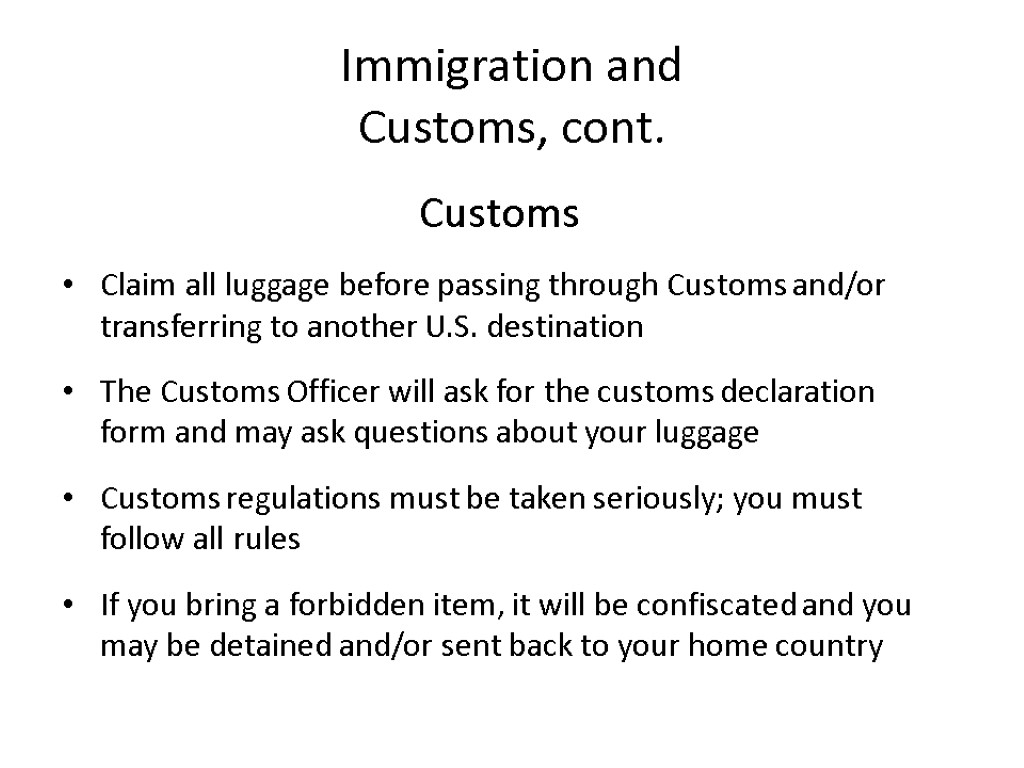
Immigration and Customs, cont. Customs Claim all luggage before passing through Customs and/or transferring to another U.S. destination The Customs Officer will ask for the customs declaration form and may ask questions about your luggage Customs regulations must be taken seriously; you must follow all rules If you bring a forbidden item, it will be confiscated and you may be detained and/or sent back to your home country
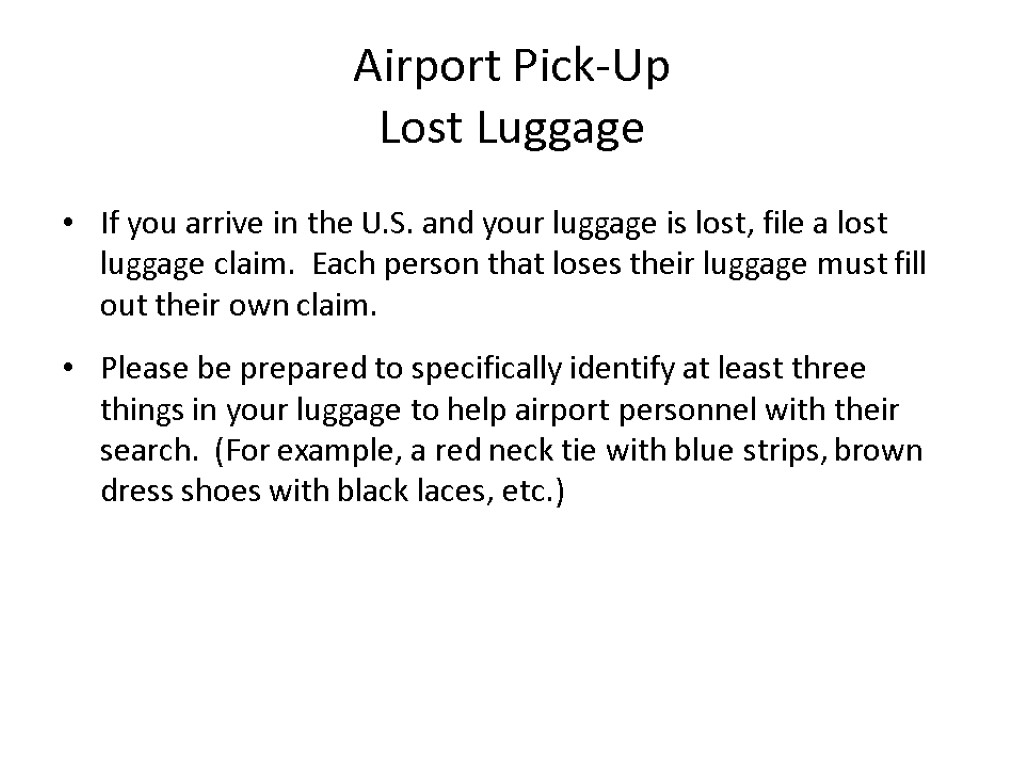
Airport Pick-Up Lost Luggage If you arrive in the U.S. and your luggage is lost, file a lost luggage claim. Each person that loses their luggage must fill out their own claim. Please be prepared to specifically identify at least three things in your luggage to help airport personnel with their search. (For example, a red neck tie with blue strips, brown dress shoes with black laces, etc.)
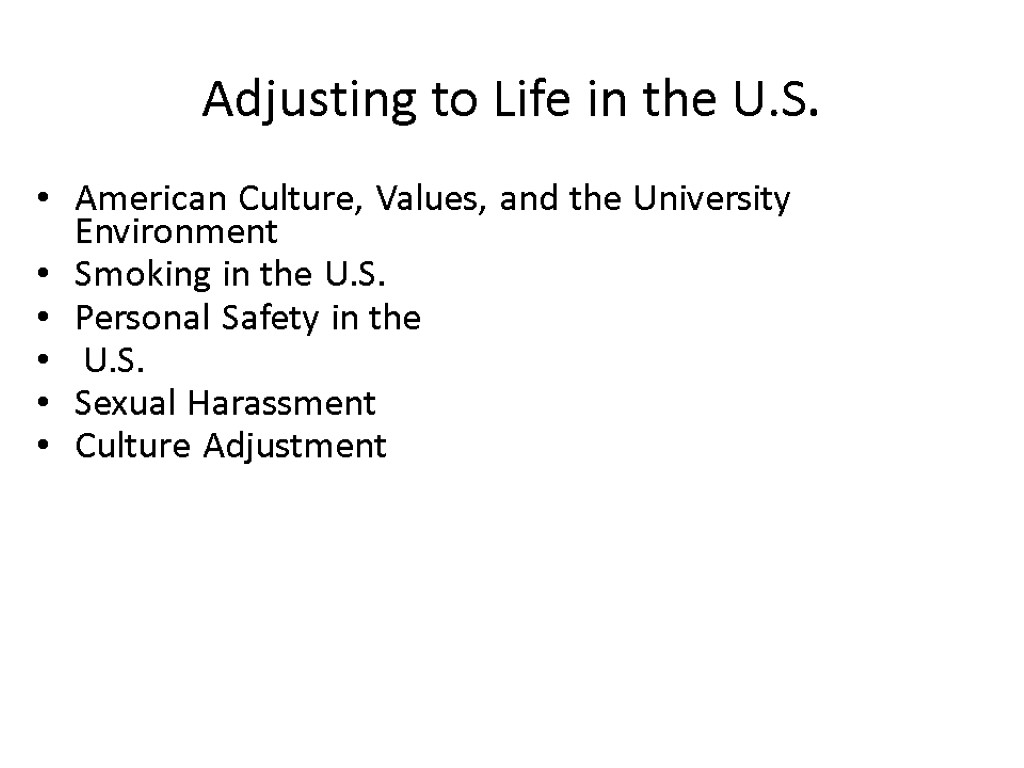
Adjusting to Life in the U.S. American Culture, Values, and the University Environment Smoking in the U.S. Personal Safety in the U.S. Sexual Harassment Culture Adjustment
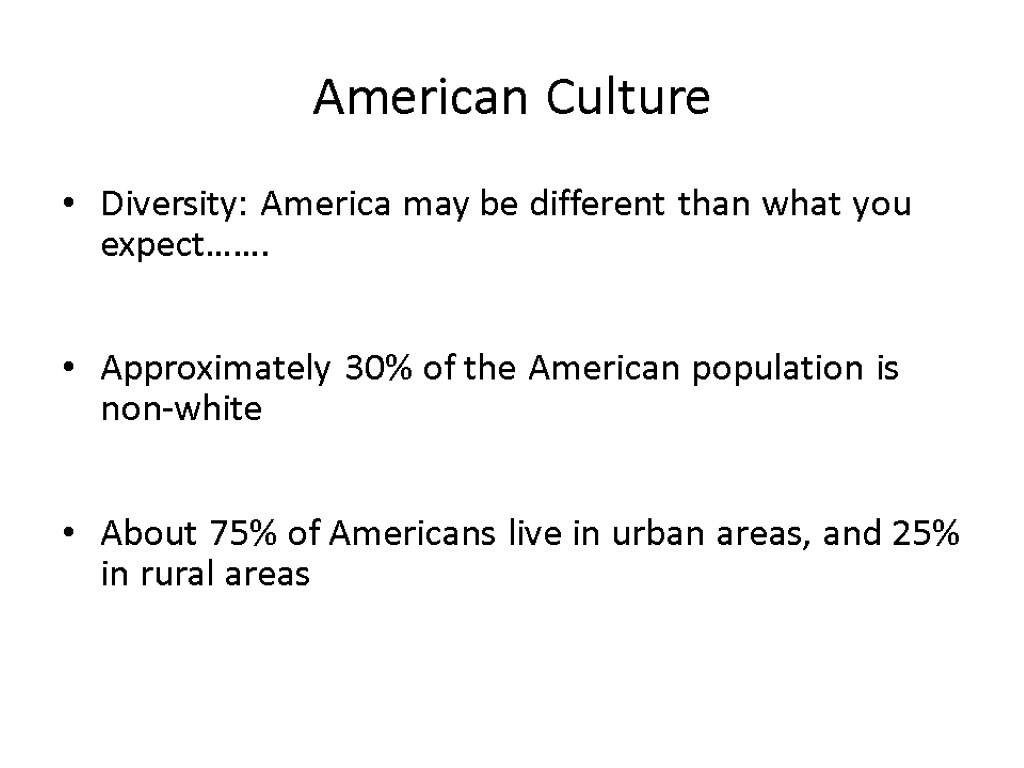
American Culture Diversity: America may be different than what you expect……. Approximately 30% of the American population is non-white About 75% of Americans live in urban areas, and 25% in rural areas
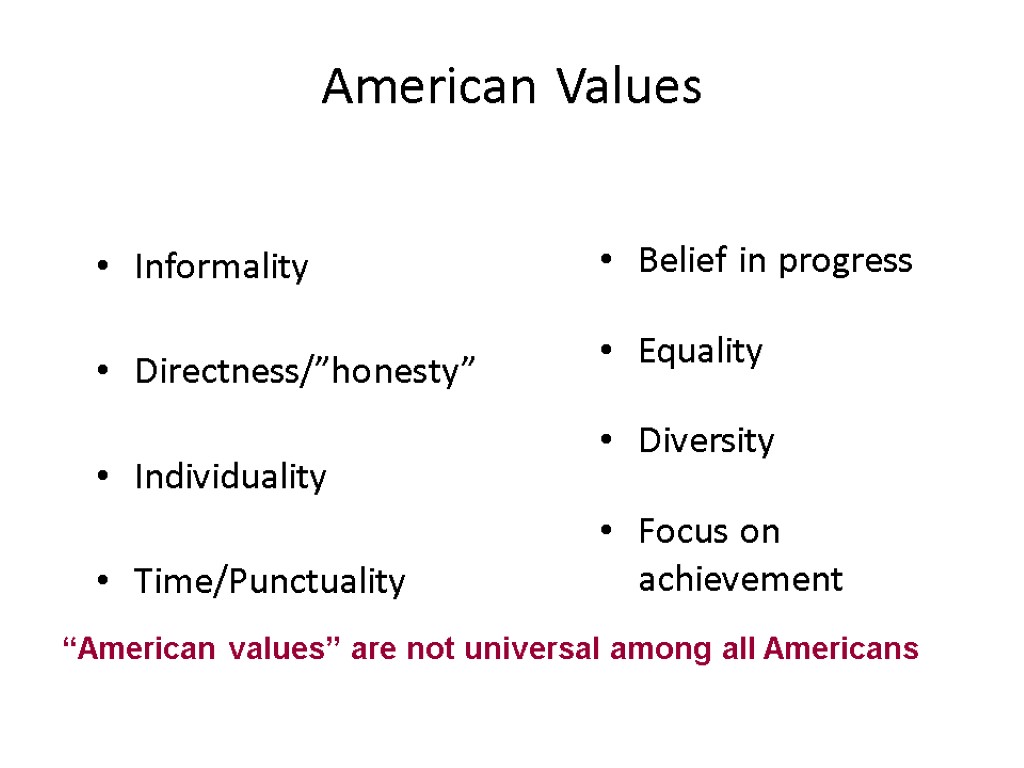
American Values Informality Directness/”honesty” Individuality Time/Punctuality Belief in progress Equality Diversity Focus on achievement “American values” are not universal among all Americans
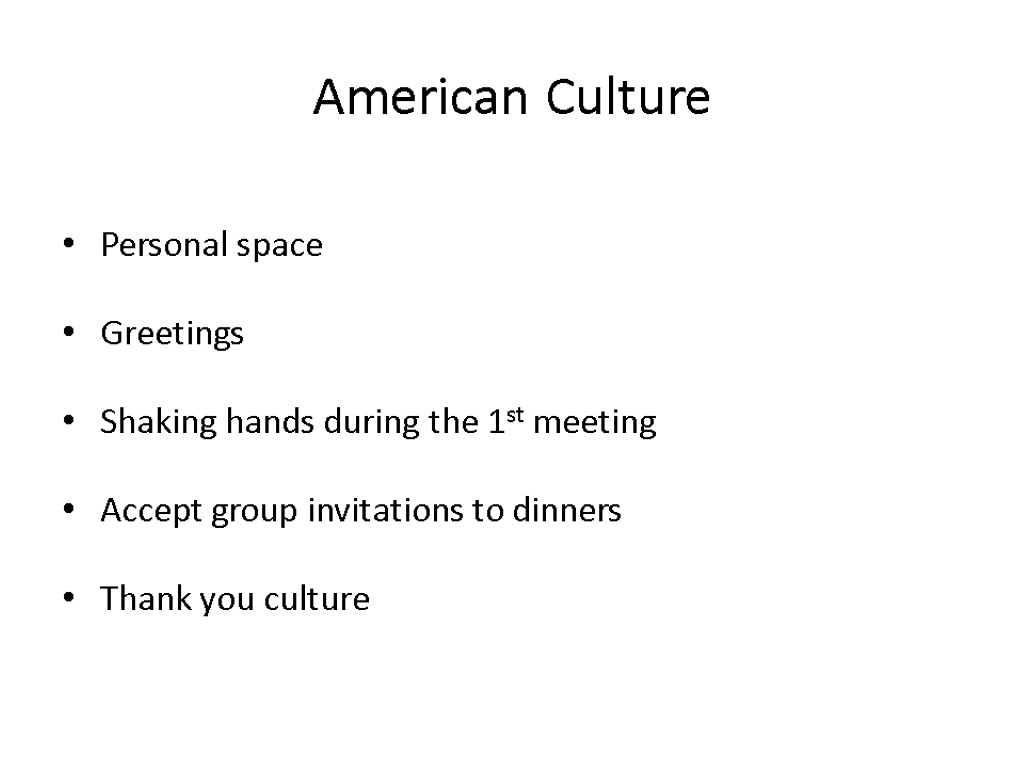
American Culture Personal space Greetings Shaking hands during the 1st meeting Accept group invitations to dinners Thank you culture
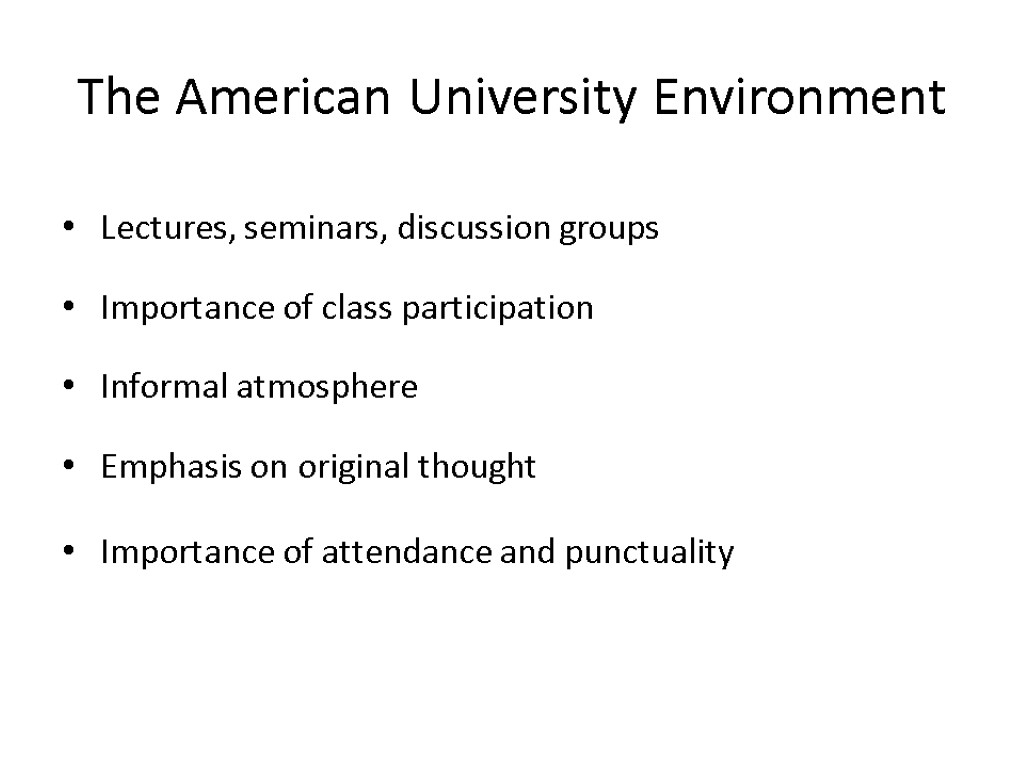
The American University Environment Lectures, seminars, discussion groups Importance of class participation Informal atmosphere Emphasis on original thought Importance of attendance and punctuality
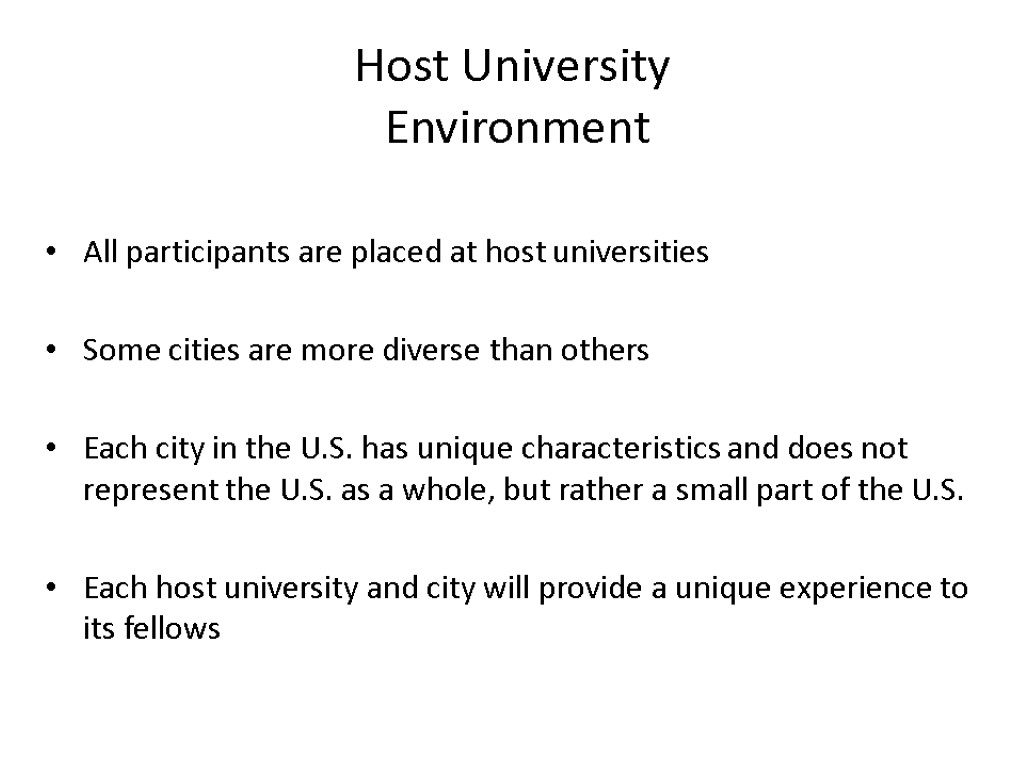
Host University Environment All participants are placed at host universities Some cities are more diverse than others Each city in the U.S. has unique characteristics and does not represent the U.S. as a whole, but rather a small part of the U.S. Each host university and city will provide a unique experience to its fellows
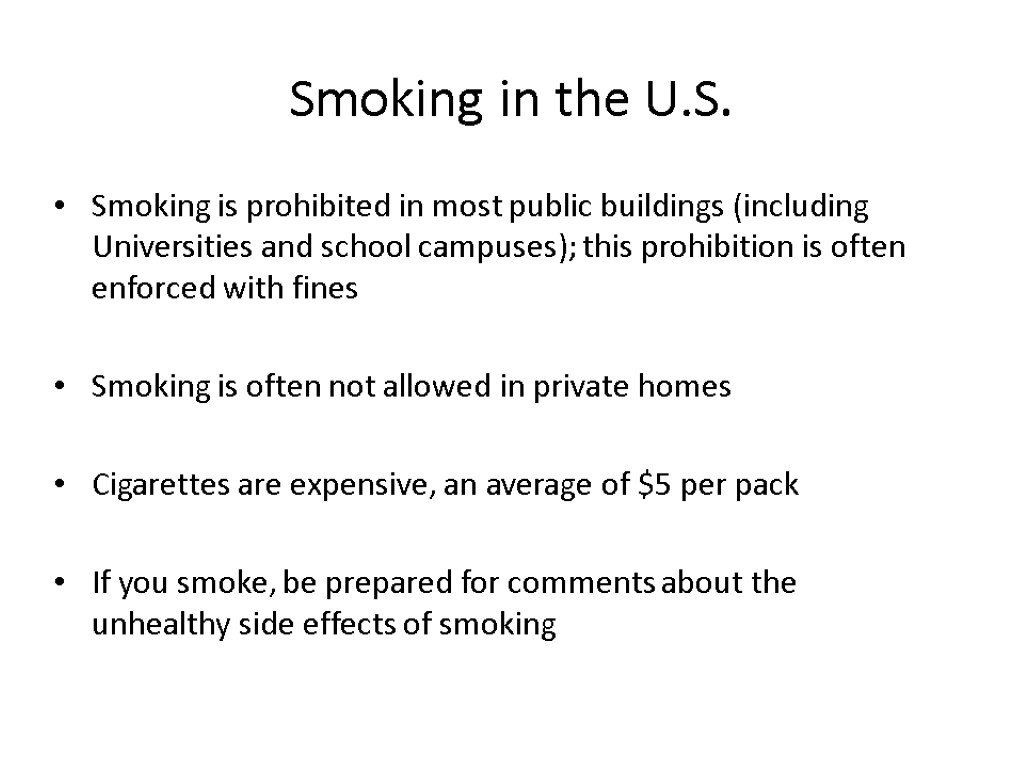
Smoking in the U.S. Smoking is prohibited in most public buildings (including Universities and school campuses); this prohibition is often enforced with fines Smoking is often not allowed in private homes Cigarettes are expensive, an average of $5 per pack If you smoke, be prepared for comments about the unhealthy side effects of smoking
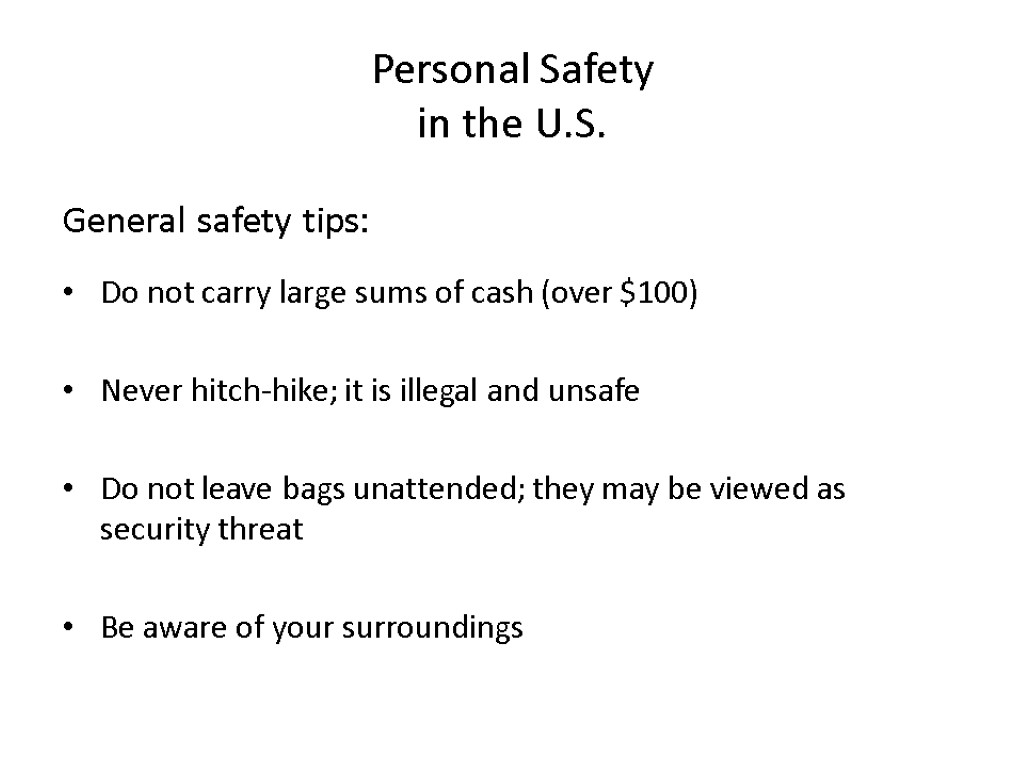
Personal Safety in the U.S. General safety tips: Do not carry large sums of cash (over $100) Never hitch-hike; it is illegal and unsafe Do not leave bags unattended; they may be viewed as security threat Be aware of your surroundings
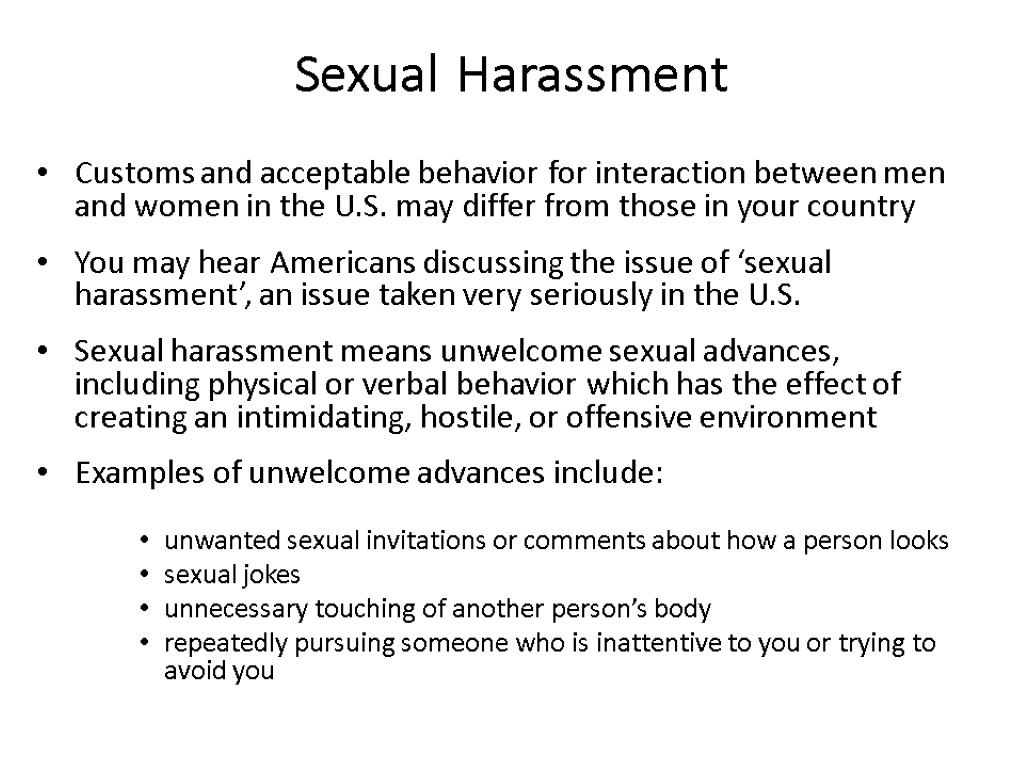
Sexual Harassment Customs and acceptable behavior for interaction between men and women in the U.S. may differ from those in your country You may hear Americans discussing the issue of ‘sexual harassment’, an issue taken very seriously in the U.S. Sexual harassment means unwelcome sexual advances, including physical or verbal behavior which has the effect of creating an intimidating, hostile, or offensive environment Examples of unwelcome advances include: unwanted sexual invitations or comments about how a person looks sexual jokes unnecessary touching of another person’s body repeatedly pursuing someone who is inattentive to you or trying to avoid you
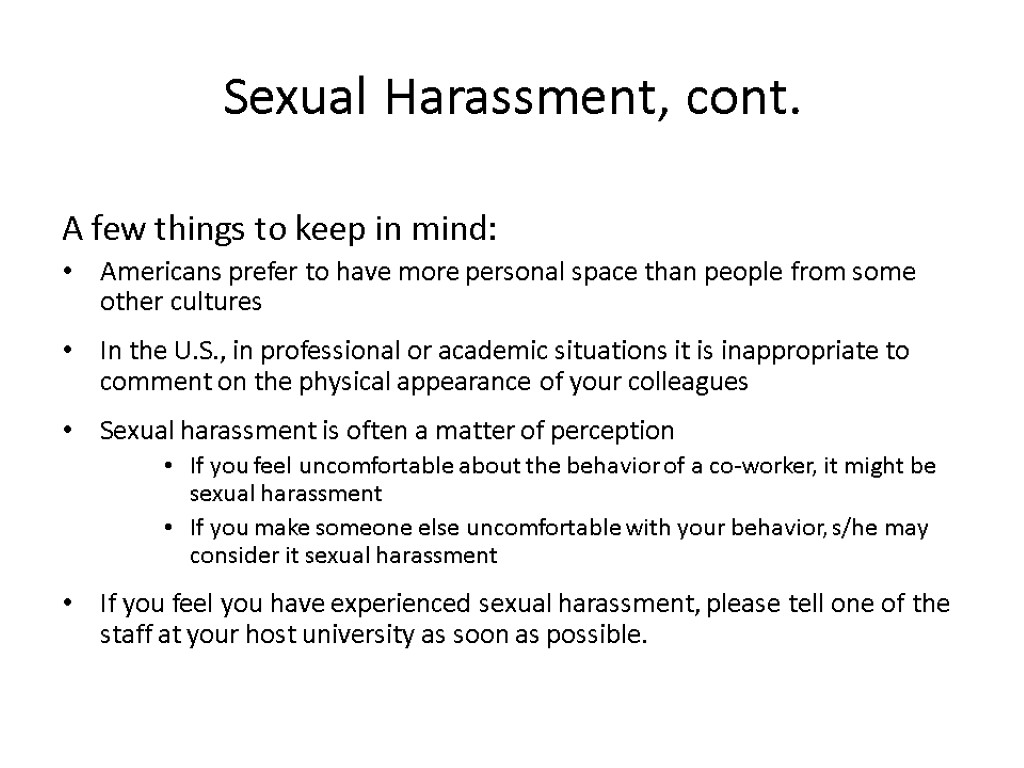
Sexual Harassment, cont. A few things to keep in mind: Americans prefer to have more personal space than people from some other cultures In the U.S., in professional or academic situations it is inappropriate to comment on the physical appearance of your colleagues Sexual harassment is often a matter of perception If you feel uncomfortable about the behavior of a co-worker, it might be sexual harassment If you make someone else uncomfortable with your behavior, s/he may consider it sexual harassment If you feel you have experienced sexual harassment, please tell one of the staff at your host university as soon as possible.
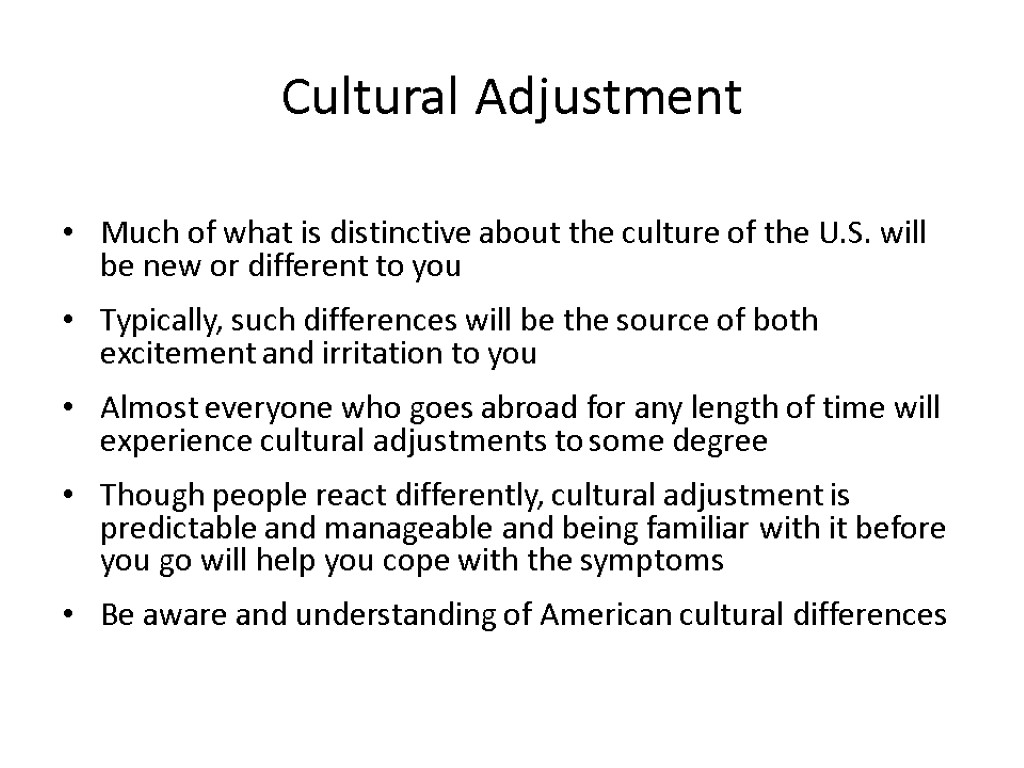
Cultural Adjustment Much of what is distinctive about the culture of the U.S. will be new or different to you Typically, such differences will be the source of both excitement and irritation to you Almost everyone who goes abroad for any length of time will experience cultural adjustments to some degree Though people react differently, cultural adjustment is predictable and manageable and being familiar with it before you go will help you cope with the symptoms Be aware and understanding of American cultural differences
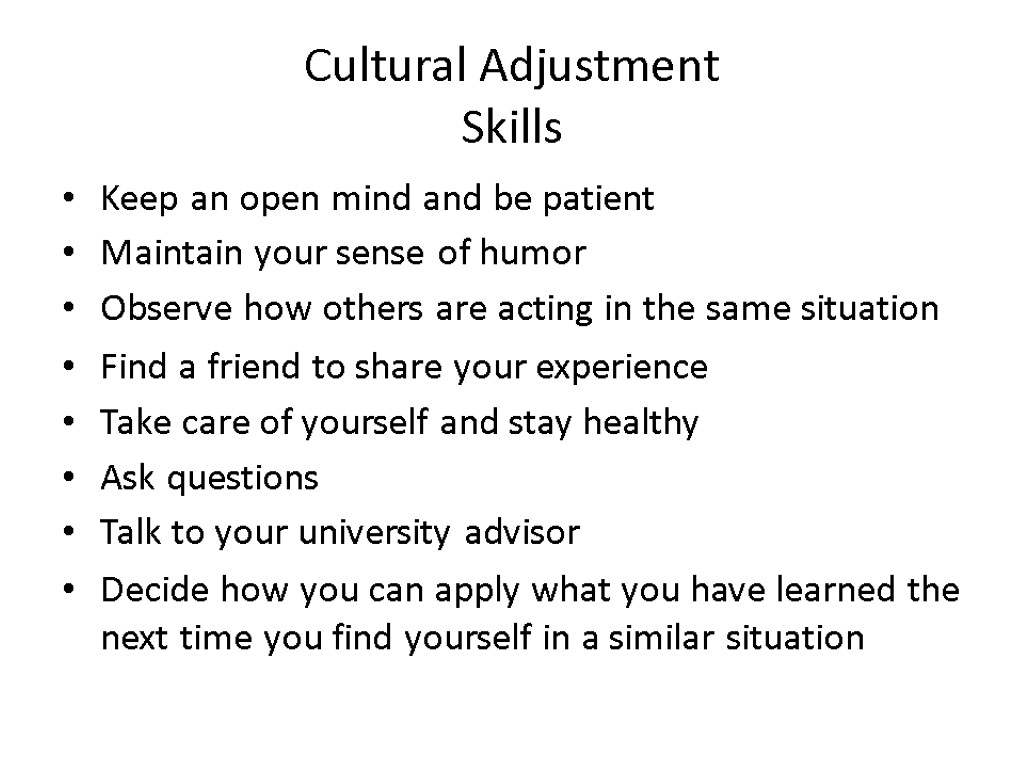
Cultural Adjustment Skills Keep an open mind and be patient Maintain your sense of humor Observe how others are acting in the same situation Find a friend to share your experience Take care of yourself and stay healthy Ask questions Talk to your university advisor Decide how you can apply what you have learned the next time you find yourself in a similar situation
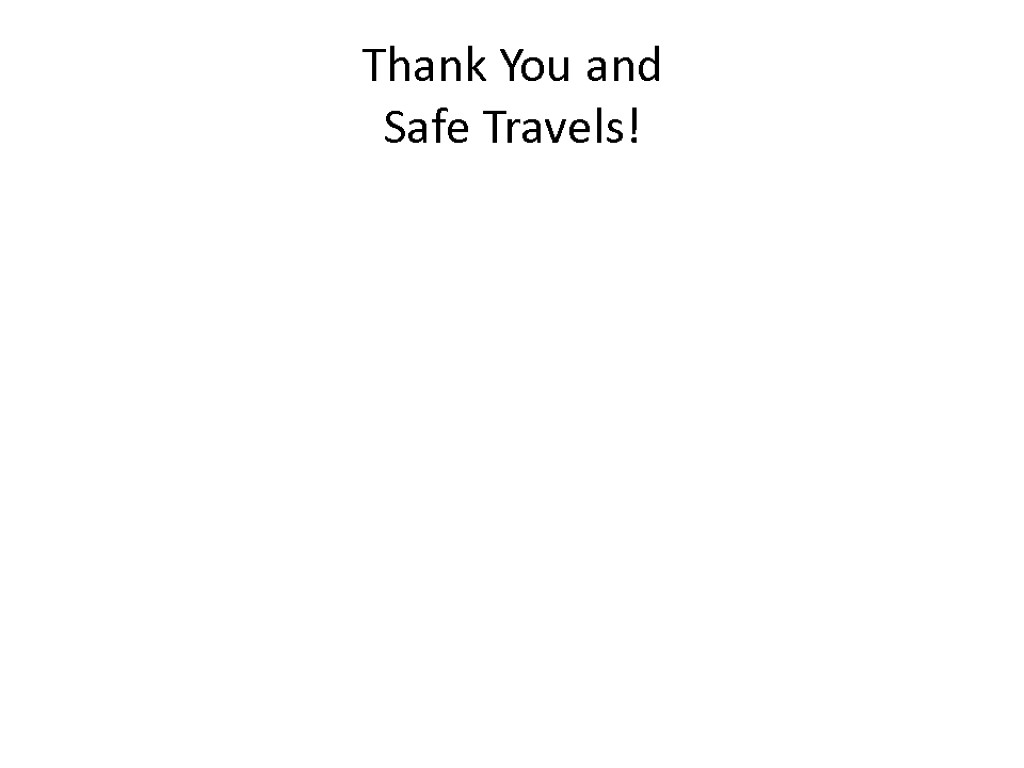
Thank You and Safe Travels!
pdo_power_point.ppt
- Количество слайдов: 51

